
Acupuncture
Acupuncture is done by using hair-thin needles and inserting them into the skin at the location of specific muscles, fascia, tendons, ligaments, joints, and nerve roots or branches. The purpose of doing this is to increase blood circulation in specific regions of the body, bringing more nutrients, minerals, and oxygen to local tissues. Modern research has demonstrated acupuncture’s effects on the nervous system, endocrine and immune systems, cardiovascular system, and digestive system. By stimulating the body’s various systems, acupuncture can help to resolve pain, improve sleep, digestive function, boost the immune system, regulate the nervous system, and more. It is through these physiologically modulating effects of acupuncture, that the body is more capable of effectively drawing on its own healing capabilities at a fuller capacity. The patient may feel nothing at all upon insertion, and occasionally, very slight to mild discomfort that passes in seconds. Acupuncture has been practiced and refined for more than 2,500 years, and remains a relevant and reliable medical modality. The World Health Organization lists a large number of symptoms, conditions and diseases that have been shown in controlled trials to be treated effectively by acupuncture. Please see the list below, and our sources at the bottom of the page. If you're wondering if acupuncture is right for you and have more questions, call us today and set up an introductory consultation!
Case-controlled clinical studies have shown that acupuncture has been an effective treatment for the following diseases, symptoms or conditions:
Allergic rhinitis (including hay fever)
Biliary colic
Depression (including depressive neurosis and depression following stroke)
Dysentery, acute bacillary
Dysmenorrhoea, primary
Epigastralgia, acute (in peptic ulcer, acute and chronic gastritis, and gastrospasm)
Facial pain (including craniomandibular disorders)
Headache
Hypertension, essential
Hypotension, primary
Induction of labor
Knee pain
Leukopenia
Low back pain
Malposition of fetus, correction
Morning sickness
Nausea and vomiting
Neck pain
Pain in dentistry (including dental pain and temporomandibular dysfunction)
Periarthritis of shoulder
Postoperative pain
Renal colic
Rheumatoid arthritis
Sciatica
Sprain
Stroke
Tennis elbow
The following diseases, symptoms or conditions have limited but probable evidence to support the therapeutic use of acupuncture:
Abdominal pain (in acute gastroenteritis or due to gastrointestinal spasm)
Acne vulgaris
Alcohol dependence and detoxification
Bell’s palsy
Bronchial asthma
Cancer pain
Cardiac neurosis
Cholecystitis, chronic, with acute exacerbation
Cholelithiasis
Competition stress syndrome
Craniocerebral injury, closed
Diabetes mellitus, non-insulin-dependent
Earache
Epidemic haemorrhagic fever
Epistaxis, simple (without generalized or local disease)
Eye pain due to subconjunctival injection
Female infertility
Facial spasm
Female urethral syndrome
Fibromyalgia and fasciitis
Gastrokinetic disturbance
Gouty arthritis
Hepatitis B virus carrier status
Herpes zoster (human (alpha) herpesvirus 3)
Hyperlipaemia
Hypo-ovarianism
InsomniaLabour pain
Lactation, deficiency
Male sexual dysfunction, non-organic
Ménière disease
Neuralgia, post-herpetic
Neurodermatitis
Obesity
Opium, cocaine and heroin dependence
Osteoarthritis
Pain due to endoscopic examination
Pain in thromboangiitis obliterans
Polycystic ovary syndrome (Stein-Leventhal syndrome)
Post-extubation in children
Postoperative convalescence
Premenstrual syndrome
Prostatitis, chronic
Pruritus
Radicular and pseudoradicular pain syndrome
Raynaud syndrome, primary
Recurrent lower urinary-tract infection
Reflex sympathetic dystrophy
Retention of urine, traumatic
Schizophrenia
Sialism, drug-induced (excessive salivation)
Sjögren syndrome
Sore throat (including tonsillitis)
Spine pain, acute
Stiff neck
Temporomandibular joint dysfunction
Tietze syndrome
Tobacco dependence
Tourette syndrome
Ulcerative colitis, chronic
Urolithiasis
Vascular dementia
Whooping cough (pertussis)


